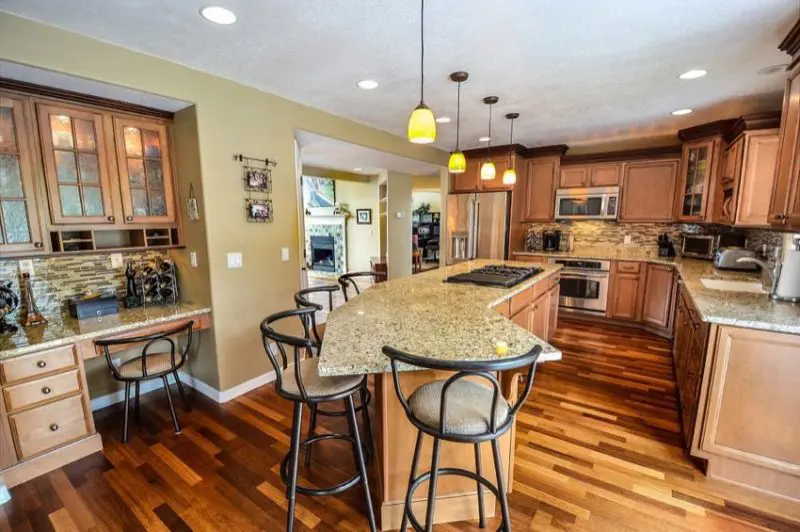For one reason or another (or many), your home no longer meets your needs. Should you remodel or move? The short answer is that there are a lot of factors in play and there are times when both are appropriate.
9 Questions to Ask Before You Remodel, Renovate, or Move
- 1. What’s Your Level of Emotional Attachment?
- 2. Will a Move Improve Your Zoned Schools?
- 3. Do You Need More Space?
- 4. Is the Entire Design of Your Home Outdated?
- 5. Does Your House Have Good “Bones”?
- 6. Do You Like Your Neighbors?
- 7. Have You Factored in Landscaping, Pools, and General Maintenance?
- 8. How are Your Finances?
- 9. What is the Effect on Your Commute?
- Parting Thoughts
1. What’s Your Level of Emotional Attachment?
Many couples have an emotional attachment to the first home they bought together. Others move to a home they inherited after one spouse’s parents pass on. No matter what the reason, if you or your spouse have a strong emotional attachment to the home, consider a remodel over a move to meet your needs. Renovating and remodeling a home can get you what you need while retaining many of those great memories.

If it’s a matter of maintaining ownership rather than living in it, renting it out to people you trust can be a way to offset the cost of keeping it while you move into a different home. It also gives your the option of returning later should you decide you want to.
Don’t discount emotion when decided whether to remodel or move. This choice stays with you a long time!
2. Will a Move Improve Your Zoned Schools?
This one’s pretty simple. Location, location, location! If the neighborhood you’re in is dangerous or you can provide a better education for your children by moving, start packing.

On the other hand, perfect neighborhoods and great schools are tough to come by. If you’re in a good place, the move or remodel decision shifts decisively into the remodel camp. Even if you currently home school, understanding the potential schools during the more difficult high school years can help steer you in a direction to either remodel your home or move.
3. Do You Need More Space?
You can gain space by moving into a new home, adding on to your current home, or sometimes by just reconfiguring the space you have. Buying a new-to-you home is exciting, stressful, and fun, but it’s not always the best option.
If it’s simply a matter of square footage, get out your calculator and consider how much it will cost to renovate or move. Don’t forget about interest rates and starting over with a new mortgage. That interest adds up over 30 years!

4. Is the Entire Design of Your Home Outdated?
The ’80s called…and they want their house back. There’s a time in every general contractor’s life when you look back and hope no one remembers you built houses with styles from decades gone by. If you’re living in one of those houses, style doesn’t have to drive you out. In fact, we collected some of the best remodeling ideas to help you move forward.
Ancient tile jobs are relatively easy to demo and replace with modern looks. You can update kitchens and floors. Repainting the interior and exterior gives you an instantly new look. We also find that installing modern architectural shingles or even a metal roof can really upgrade the look of your home…provided it’s structurally sound.

Also, consider improving curb appeal with a landscaping makeover.
As a bonus, giving a modern update to an older home can really improve its value if you decide to sell later on. On the other hand, you might just fall back in love with it and stay for another 20 years.
5. Does Your House Have Good “Bones”?
Perhaps you have plenty of square footage in your home, but the space just isn’t optimal. Simply renovating an existing room (or two) may solve a host of issues. When you remodel your home, you update the areas you need to change while leaving the rest of what you love alone.
When you consider whether to remodel or move, remember walls and doors can relocate as well. It’s just drywall, studs, electrical, and plumbing. Okay, so that might oversimplify things a bit. Still, for a qualified contractor, remodeling an area of your home isn’t as scary as it sounds.

6. Do You Like Your Neighbors?
Whether your neighbors have a noisy dog—or host a “used car lot” on their lawn—their behavior can make your life pleasant or miserable.
While there are often codes that you can report to alleviate some of the frustration, moving is the only guarantee you have to get away from them. While we always advocate for making peace with neighbors, you certainly can’t force good behavior if it doesn’t break the law. In that case, moving might provide some relief.
7. Have You Factored in Landscaping, Pools, and General Maintenance?
I’m the kind of guy that doesn’t want to spend all day Saturday working on the yard. I also don’t want to pay someone to do it. So I completely understand when it’s time to pull back on the lawn care and go for a smaller lawn. It may be that work is just too crazy or you’re just getting far enough in age that it’s tough to keep up. Either way, moving is your best bet unless you find some disposable income to hire it out.

8. How are Your Finances?
As we move up in our careers, a pay raise brings opportunities to move into a different house in a new neighborhood. Conversely, layoffs, retirement, or unexpected emergencies can drain your financial situation. In those cases, downsizing makes good sense.
If you’re on the upswing of your career, remodeling, adding on, and moving are all viable options. If you’re looking at having less or fixed income, moving might be your best bet. Also, don’t forget about your refinancing options. If you can lower your mortgage and have some equity in your home, that can lower your payments considerably.
One thing we rarely recommend, however, is losing your progress when refinancing. We’re not licensed financial professionals, however—around here—we love to see houses paid off as soon as possible. Despite what some accountants might tell you, having debt really isn’t a good thing. If you only have 15 years left on your mortgage, we recommend (unofficially) you do everything in your power to convert to a 15-year (or lower) term. Going back to a 30-year loan results in a dramatic increase in overall interest paid over the life of the loan.
9. What is the Effect on Your Commute?
Our last question might be the biggest? How far do you commute? You can’t make a 25-hour day, but shortening your commute can literally add hours to your day in some cases. Sitting down to dinner at 6:00 sure beats sitting in traffic at the same time. This one obviously requires a move.

Parting Thoughts
Whether you remodel or move, it’s a big decision and one that you shouldn’t take lightly. Planning ahead and talking with a trusted financial advisor can make the path more clear.
One thing to keep in mind – if you ask for an estimate from a contractor for renovation or remodeling work, expect to pay him or her for their time. The time they’re spending with you is time they’re not building and they have families to feed as well. On the upside, many contractors will credit you the cost of the estimate if you choose their company to do the work.



